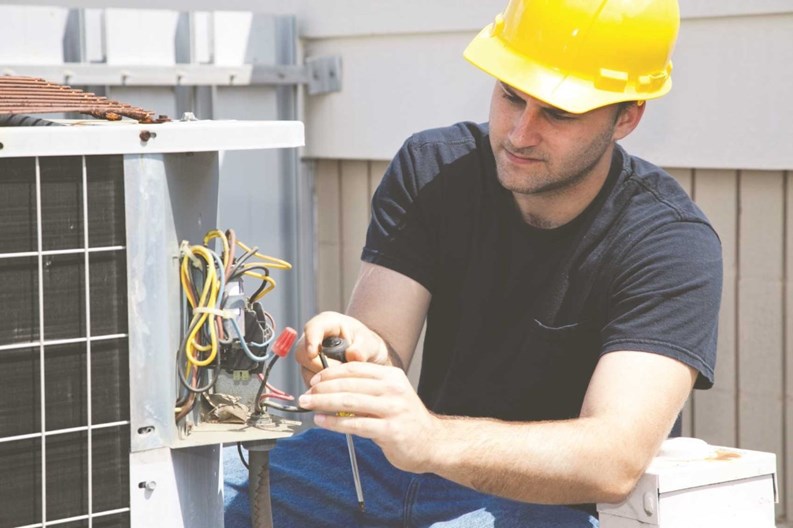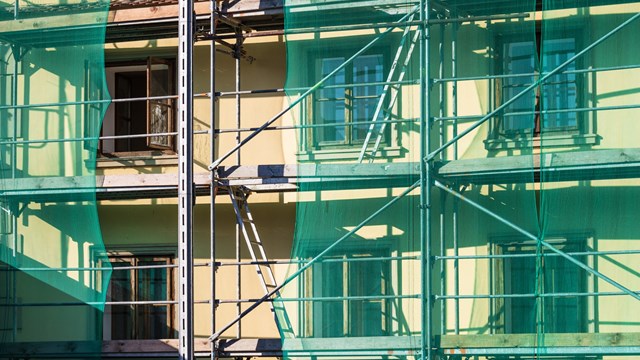With harsh winters and blistering hot summers, those living in Chicagoland’s condominium and townhome communities understand the importance of properly working heating, ventilation, and air conditioning (HVAC) systems.
That’s why it’s important for managers and residents to know who is responsible for what and how to properly maintain these systems, which could be a single heating/cooling system for the entire building or individual furnace or cooling systems in each unit. After all, in residences such as large high-rise buildings or townhome communities, a variety of HVAC technologies can be found. HVAC is the umbrella term for the system that includes all the equipment used to ventilate, heat and cool the building, move the air through the ductwork, and have that air filtered and clean for the occupants.
David Burggren, vice president of sales at Midwest Mechanical in Lombard says that there are a variety of different HVAC systems. “It varies dramatically. Some buildings have systems that are very centralized, other buildings have systems that are very decentralized and have much more of the equipment in the tenant or owner's spaces. One of the common things that we are looking at with a condo or high rise building is that there will be some level of equipment that supports the building, the common spaces, even if the tenants each have their own air conditioning units,” he says.
Burggren says that water-cooled or chiller boiler systems are also popular and efficient for large condo buildings. They combine the chiller, boiler, pumps and controls into a single package for simple installation and maintenance. A water-cooled system has a cooling tower which cools water that serves all units in a building, rather than each unit having its own.
“Water cooled systems are more efficient than an air-cooled chiller. They cost more up front and there can some additional maintenance costs but they are 30 to 50 percent more efficient,” he says.
Proper Care
HVAC systems are one of the largest and most important systems in your building so regular maintenance is critical. It is key to first determine what maintenance can be performed at the level of the unit owner, what needs to be addressed by the property manager and finally, what situations or problems should only be tackled by a trained and certified professional.
Burggren suggests meeting with a heating and cooling company to discuss what is required of the particular system in your building, understanding what maintenance needs to be performed and when and how best to allocate the budget reserved to maintaining the HVAC system. “It's sort of a customer tailored program depending on the equipment itself, the budget, the expectations and the issues that the folks want to confront,” he says.
Many industry professionals will agree that checking and changing of the unit filter is a key step in ensuring the health and longevity of your HVAC system.
Michael J. Carpenter, vice president of Althoff Industries, Inc. in Crystal Lake says that filters should be changed or washed quarterly. He also suggests that coils be washed annually, but those in relatively close proximity to cottonwood trees and pollutants may require coils to be cleaned an additional time during the cooling season.
Burggren also stresses the importance of cleaning as part of HVAC maintenance. “Whether we are talking about cleaning the coils that provide the cool and warm air, replacing filters or cleaning electrical components, keeping the varying parts of the system clean is irrespective of the season and is a reoccurring task,” he advises.
According to Michael Vinick, president of Duct & Vent Cleaning of America, and a board member of the National Air Duct Cleaners Association (NADCA), every time the furnace or air conditioner is in operation, dust, dirt particles, debris, pollen, pet dander and other pollutants are drawn into the duct system and must be cleaned.
In addition to these tasks, there are a number of checkups that should be performed by your heating and cooling company to ensure that your system is as efficient and effective as possible. John Lillis, vice president of residential sales at All Temp Heating & Air Conditioning, which covers the entire Chicago area, says that a certified professional will check the voltage and amperage of all motors with a meter, check for adequate refrigerant charge, check the belts and adjust tension, adjust the burner and check for vibrations and noise, just to name a few items.
Finally, unit owners and property managers should pay special attention to energy consumption, as it is a clear indicator of system perfomance.
“Most units brand new are operating at 80-85% efficiency,”says Don David from DRF Total Property Solutions in Plainfield. “ The older they get the less in efficient they are. When your energy bills are growing outside of the normal therm usage, there is probably a problem
What If?
With the economic problems facing many buildings and residents in 2012, sometimes routine or mundane maintenance tasks may be skipped, causing harm.
“The biggest mistake, and we see it daily, Property managers are reactive as opposed to being proactive. There is no urgency because the unit is running today. The thought of it not running tomorrow is sometimes an afterthought,” says David.
He says that this type of attitude can lead to increased maintenance and upkeep costs as well as a bigger hole in your wallet. “Not performing regular maintenance has one major cost: It is costly. If a system goes down, panic sets in. “I need heat now” usually means, please open your wallet. From a green standpoint, without regular maintenance, you are leaving a larger carbon foot print. Your utility costs go over budget and the equipment has a much shorter life span.”
It is also critical to maintain and check up on new equipment and not neglect systems just because they are recently purchased or installed.
“One of the biggest mistakes is to not take care of new equipment. It’s easy to think that you don’t have to perform maintenance, since it’s new. However, the life expectancy of your equipment gets shorter with every maintenance missed,” says Carpenter.
Greener Options
With today’s environmentally-friendly way of thinking, a number of HVAC green/energy innovations are finding their ways into Chicago. Burggren said he is surprised at the number of buildings that do not take advantage of energy-saving equipment and practices such as programmable thermostats which “have been been on the market for a long-time.”
One popular product that he mentions is a variable frequency drive. It helps fans and pump motors run more efficiently and eliminate the hard stops and starts that they make. “The harsh stopping of the fans and pumps is like city driving on your car, it is less efficient and tougher on the the car.” The drive controls the rotational speed of an alternating current (AC) electric motor by controlling the frequency of the electrical power supplied to the motor.
Another green HVAC technology that has been around for a while but has seen increased popularity is an automated system that allows you to control the duration and intensity of your heating and cooling.
“Building automation systems allow you to schedule and monitor your systems. Areas can be set as “Unoccupied” when not in use, and temperatures do not have to be set at optimal settings. This saves you money on energy usage. Being able to monitor your systems can offer you advanced warning to problems with your equipment,” says Carpenter.
David adds that modulating boilers are yet another eco-friendly option for condo systems. “Condensing and modulating boilers are a new technology. They run at a consistent level as opposed to quick start quick off. Think of flooring the accelerator in your car-not efficient. Slowly ramping up speed in your car is more efficient. This the same way a modulating boiler runs.”
Other co-gen technologies include micro-turbines and fuel cells. By making continuous use of both electricity and thermal energy, condominium residents can save up to 35 percent on overall energy costs.
Also slowly coming into play are the addition of photovoltaic panels, a method of generating electric power by converting solar radiation into direct-current electricity using semiconductors that exhibit the photovoltaic effect. The direct current is converted into alternating current and connected to the building electrical distribution system.
While some of these green innovations are optional for communities, increased government regulations and overall heightened environmental awareness are making certain mandates for HVAC units.
“In 2006 the government mandated all air conditioners had to be at least 13SEER (Seasonal Energy Efficiency Ratio), which means that the efficiency was increased by on average 15% from the older models. In 2009 all new air conditioners had to be freon free, which means the refrigerant being used was changed to allow the air conditioners to achieve higher efficiencies, freon was considered to a unfriendly environmental refrigerant,” explains Lillis.
He continues to say that “next year all chimney vented furnace that require replacement will have to be vented with PVC through the side wall of the structure or up through the roof. This will present challenges in town homes and condos due to the nature of the structure’s configuration.”
Final Thoughts
Since the life expectancy of an HVAC system is approximately 20 to 30 years, maintaining it correctly should have it working up to and possibly beyond those years. Without proper maintenance, breakdowns will occur and you may be looking at a full system replacement years earlier than expected.
“Long-term, corrective maintenance over the life of a piece of equipment will extend the life or prevent the early replacement, which is a dramatic cost benefit to the building,” says Burggren.
He says that there was a property management study done that confirmed that doing the correct level of maintenance was financially beneficial to the owners and managers of the building. One of the key components was that doing preventative maintenance will keep your unexpected repair costs go down.
“I think that is pretty intuitive. If we do better maintenance on something, we will prevent break downs and prevent premature system replacement.”
Keith Loria is a freelance writer and a frequent contributor to The Chicagoland Cooperator. Editorial Assistant Maggie Puniewska contributed to this article.







Leave a Comment